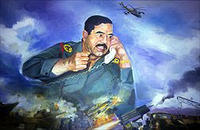 It is the role of government to protect the wealth of its people. This is but temporary unless governments can enhance or act to enhance wealth. This is the process that, using the Relationship Value Model, brings about democratisation. It is also the process needed for stable government.
It is the role of government to protect the wealth of its people. This is but temporary unless governments can enhance or act to enhance wealth. This is the process that, using the Relationship Value Model, brings about democratisation. It is also the process needed for stable government. Civilisation has the advantage of passing on wealth in the nature of knowledge from one generation to another. The acquisition of knowledge through its exchange between people is thus of the current generation and their ancestors. But there is a knowledge process in which two pieces of knowledge create a third understanding and thereby new knowledge or new wealth.
People cannot create wealth without knowledge because we are dependent on the accumulation of learning for survival from birth. Without it, babies die. We can only effectively learn through relationships.
But learning is not enough in the process of creating wealth. We are able to use creative capabilities to enhance knowledge. In other words to add value to knowledge or, more precisely, to add values to knowledge and the values we hold.
The distribution and re-distribution of knowledge is simple vendor/customer relations which is a re-distribution of wealth. There are function of government that re-distributes wealth. This approach to government is legitimate only when it is incurred as part of the wider process of government, namely to sustain (protect) and enhance the wealth of its people.
These tax and spend functions inevitably end up making the provider wealthy and the customer poor and thereby creating demand for even more wealth distribution.
Health provision is a classic case. The endless growth of health care expenditure distributed money from the health rich people to the health poor people. It does not necessarily make people healthy but does make them demand more.
The role of government is to both create an environment in which people can gain new wealth and, in its role as distributor of wealth, add value or create the means for added value in the process.
This means that its role is not just to be a provider of redistributed wealth (healthcare) it is to add value in the process. In the case of health care, it should provide both healthcare and the opportunity for the tax payer, government and the poorly to take out something else – added value. Three groups thereby all gaining some new knowledge or values.
The tokens used in government public relations have to offer values through networks and their channels for communication that are both conducive to convergence for the three groups (e.g. tax payer, tax collector, tax recipient) and offer the means for value added.
Regrettably, a large part of government communications is focused on getting the government's message across which is, as we all know, propaganda.
(The picture is from 'What it Means')
No comments:
Post a Comment